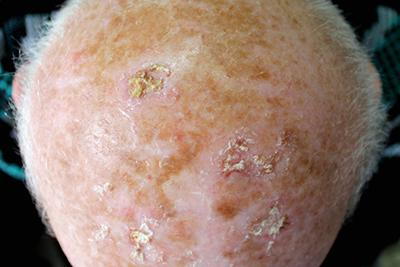
Actinic Keratosis in Balding Men: Special Considerations and Treatment Challenges
You may be self-conscious about losing your hair but also pay attention to the skin on your scalp. After all, that skin is now exposed and can deal with the same skin cancer risk as any other part of your body without protection. If you notice lesions developing on your balding scalp, it may be time to seek actinic keratosis care in Kissimmee and Ocoee FL, at the office of Dr. Clifford Lober.
What Is Actinic Keratosis?
As you age, you may notice the development of skin lesions from sun exposure. Actinic keratosis lesions usually appear on the back legs, arms, neck, scalp, and even the face. It's more common among lighter-skinned people. You may feel them even if you don't see them, as they may only have a light pigment that easily blends into your normal skin color. They can be scaly and feel like sandpaper when you touch them.
What Are Risk Factors?
These normally benign lesions result from ongoing sun exposure. People over the age of 55 tend to have these lesions more often, but it can also be seen in younger people. The lighter your skin is, the more susceptible you are to risk. If you often engage in outdoor activities, like sports or working outside, you should have proper protection through clothing and sunscreen with a SPF of 30 or more.
How Can a Dermatologist Help?
If you have lesions on your scalp, a visit to Dr. Lober for actinic keratosis in Kissimmee and Ocoee FL, may involve cryotherapy that freezes the lesions with liquid nitrogen. However, topical medications may be needed instead if there appear to be numerous ones. Diclofenac, Imiquimod, and Fluorouracil creams are often used as a topical solution.
Regarding follow-up care, patients must be careful with their ongoing sun exposure and always use SPF 30 or more. The UV rays are most powerful between 10 am and 2 pm. After all, if you're not careful, untreated keratosis can develop into squamous cell carcinoma.
Dealing with losing your hair can be a hard adjustment for many people. However, don't forget to take care of the skin underneath, as it is just as delicate as the skin on the rest of your body. Pay attention to the signs that you may need treatment for actinic keratosis in Kissimmee and Ocoee FL, so you can prevent it from turning into cancer or gaining more lesions. Call the Kissimmee, FL, office at (407) 846-7166 and the Ocoee, FL, office at (407) 656-9700, FL, for a consultation with Dr. Clifford Lober today.